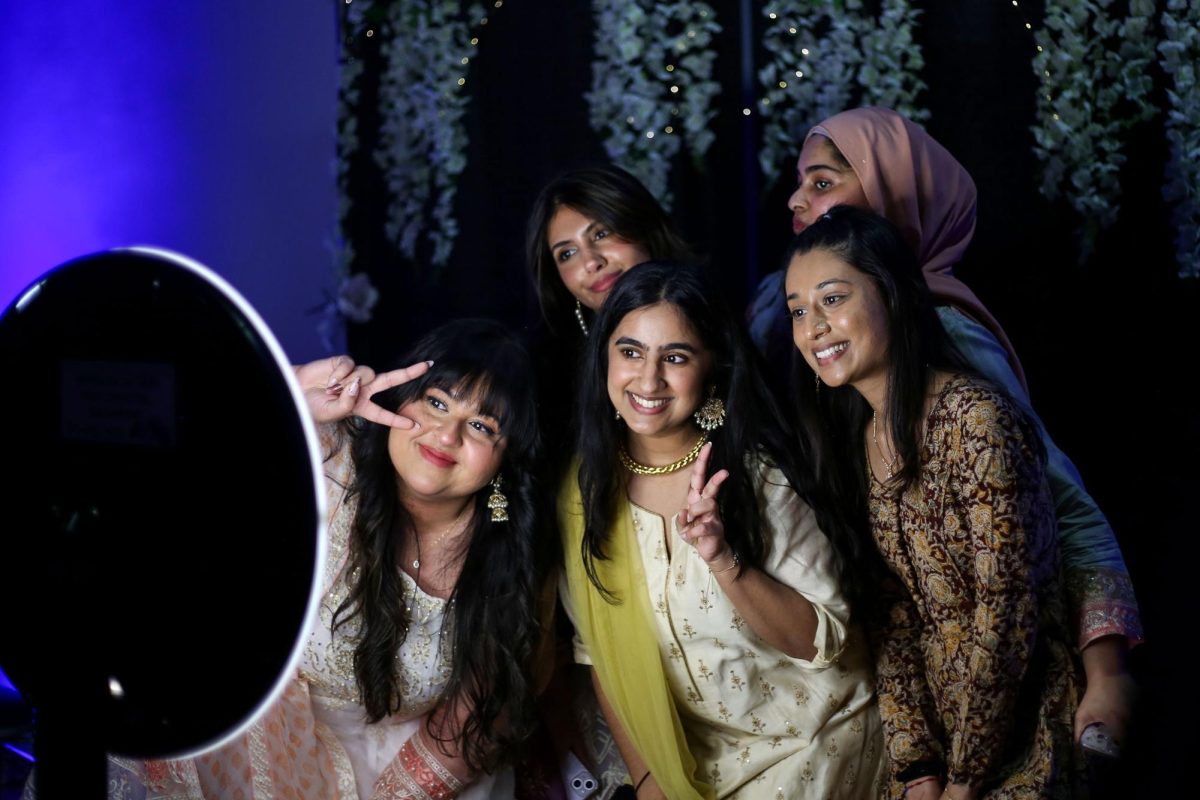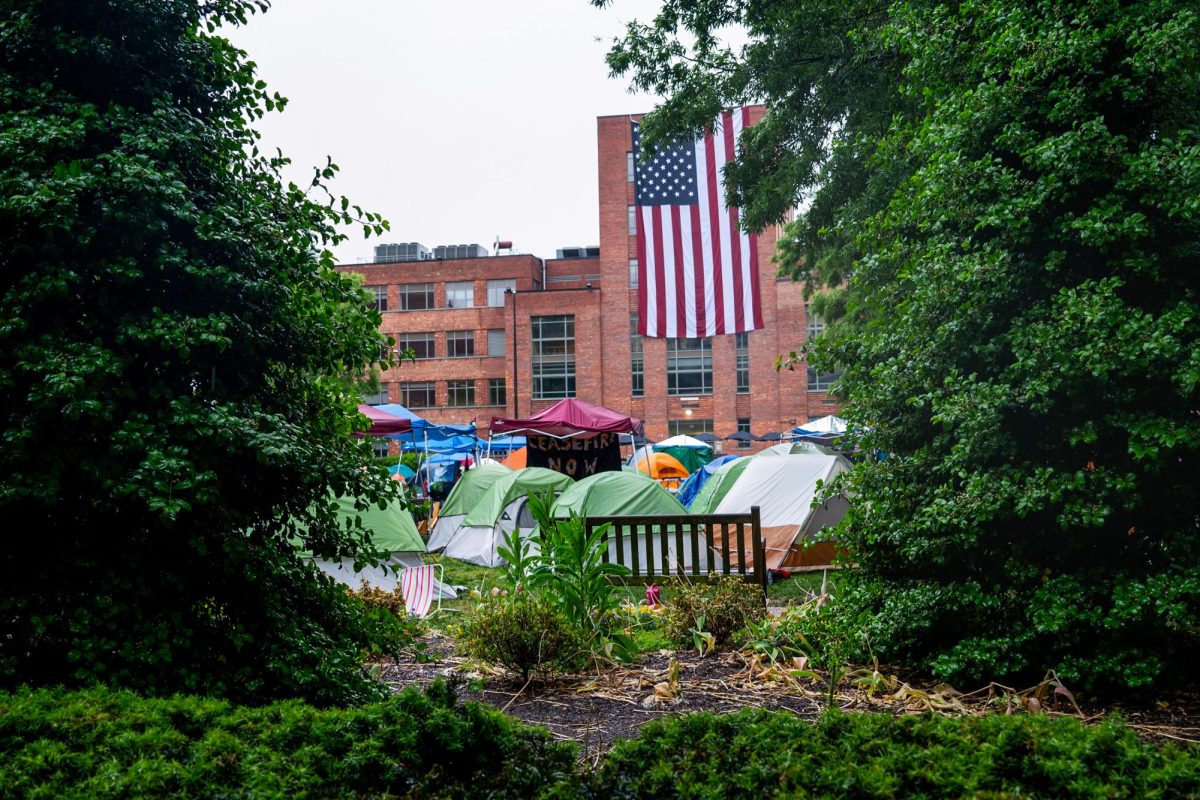South Asian students will celebrate storytelling and tradition this month for GW’s 11th-annual South Asian Heritage Celebration.
Approximately four student organizations will host events that showcase multi-regional diversity and welcome attendees to share their childhood memories during the month of March. Student leaders said this year’s celebration with the theme “Once Upon a Time: Weaving the Threads of Tradition, Diversity, and Resilience Through the Art of Storytelling” will prompt students to embrace the lived experiences that shape the culture of South Asian communities.
Hundreds of students, many dressed in traditional South Asian clothing, attended Mock Shaadi — a mock South Asian wedding — to kick off the month in the University Student Center on Friday. The night began with the baraat, or grand entrance, of the bride and groom Farina Khan and Ramiz Rahat. The South Asian Society capped off the night with dance performances to Bollywood songs like “You are my Soniya” by Sandesh Shandilya, Sonu Nigam and Alka Yagnik as well as “Mujhse Shaadi Karogi” by Sonu Nigam, Sunidhi Chauhan and Udit Narayan.
Saher Mir, the celebration’s co-chair for the Pakistani Students Association and a Hatchet videographer, said this year’s Mock Shaadi captured the storytelling theme because the organizers based the mock wedding on Heer Ranjha, a Punjabi folk tragedy similar to Romeo and Juliet, where the bride and groom die after eating a poisoned dessert.
“It’s not like a full-fledged skit, but we try to incorporate parts of the story into our programming,” Mir said.
Mir said Mock Shaadi is one of the PSA’s biggest events of the year, and to mimic a real wedding, the organization got catered food and hired a professional decorator.
“Having a fake wedding, being able to dress up in traditional attire, it’s kind of a practice for real life,” Mir said.
Parisa Aziz, the competition director for GW Garmi, a competitive Bollywood fusion dance group, said the group’s performance at Mock Shaadi evoked the dances to upbeat and romantic music that family members often perform in traditional South Asian weddings. She added that she appreciates gathering with people of different South Asian cultures to stay involved because the D.C. area has a small Bangladeshi community.
“It’s so important to embrace that we’re all part of very similar cultures, but not exactly the same one,” Aziz said. “We’re learning from each other and just building a very strong community.”
Anjana Murugan, a second-year and the secretary for GW Chamak, a women-centered multicultural dance team, said the group’s three-part dance performance at the event began with a Latin-style dance using the song “Suavemente” by Elvis Crespo, followed by “Dilbar,” a North Indian style and “Maari Thara Local,” a South Indian style dance. The different experiences and personalities of Chamak’s members blend together during their performances to form a story, Murugan said.
“We have members from all sorts of backgrounds and ethnicities and cultures,” Murugan said. “We really like to highlight that, show what each of us has to offer, and the cultural diversity that we bring in our dances reflect that as well.”
Senior Prerna Polepally, the vice president of programming for SAS, said the group will host a keynote event March 23 in the Jack Morton Auditorium and a campfire event for students to tell stories from their childhood March 30, which will close out the month and help students learn about familial and religious traditions in South Asia.
“There’s different countries, different cultures, different diasporas and we encompass an extremely large region,” Polepally said. “Storytelling is a massive part of the culture.”
Sophomore Aditi Venkateswaran, the programming chair for the Indian Students Association, said the group hosted a Stranger Project event Saturday at The George Washington University Museum and The Textile Museum, where more than 70 students displayed personal stories, artwork and poems about their experiences in the South Asian community. Venkateswaran said the group started collecting submissions in February through tabling and online submissions, inspired by a similar exhibit in New York City of the same name.
Attendees pored over submissions hung on illuminated easels. Poems and personal essays dove into topics like grief, hometown experiences and love in South Asian communities.
“Every South Asian has their own experience depending on their various identities and the intersectionalities of those identities,” Venkateswaran said. “It’s really interesting and cool to see what it’s like to be with other people.”
Later this month, ISA plans to host Khaana Khazana, a culinary event where students will try food from vendors in the D.C. area from different regions in India.
“Food is a huge part of Indian culture,” Venkateswaran said. “Telling a story through a culinary lens is a really big deal for us.”
Venkateswaran said she hopes SAHC celebrations encourage students to embrace their identity and expose them to cultures they may not be familiar with. Venkateswaran said she feels there is often unnoticed racism against the South Asian community, which is often portrayed as South Asian people being “nerdy” or “undesirable” in the media.
“We don’t talk about it as much with South Asians, which is a huge, huge issue, ” Venkateswaran said. “I’m hoping that awareness about our culture can help erase some of that racism.”
Sophomore Prisha Sharma, the head of programming for Hindu Students Association, said the group will host Holi, the festival of colors welcoming spring, in Square 80 on March 30. Sharma said the organization will provide colorful powder for attendees to throw in the air to represent the colors of spring.
Sharma said booking space in Kogan Plaza for Holi was a challenge because the University will not let them use Kogan Plaza since the powder may stain the ground. The group will host the event in Square 80 but will have to put tarp down to protect the grass, she said.
“It’s kind of a celebration of good over evil,” Sharma said.
Jennifer Igbonoba contributed reporting.





